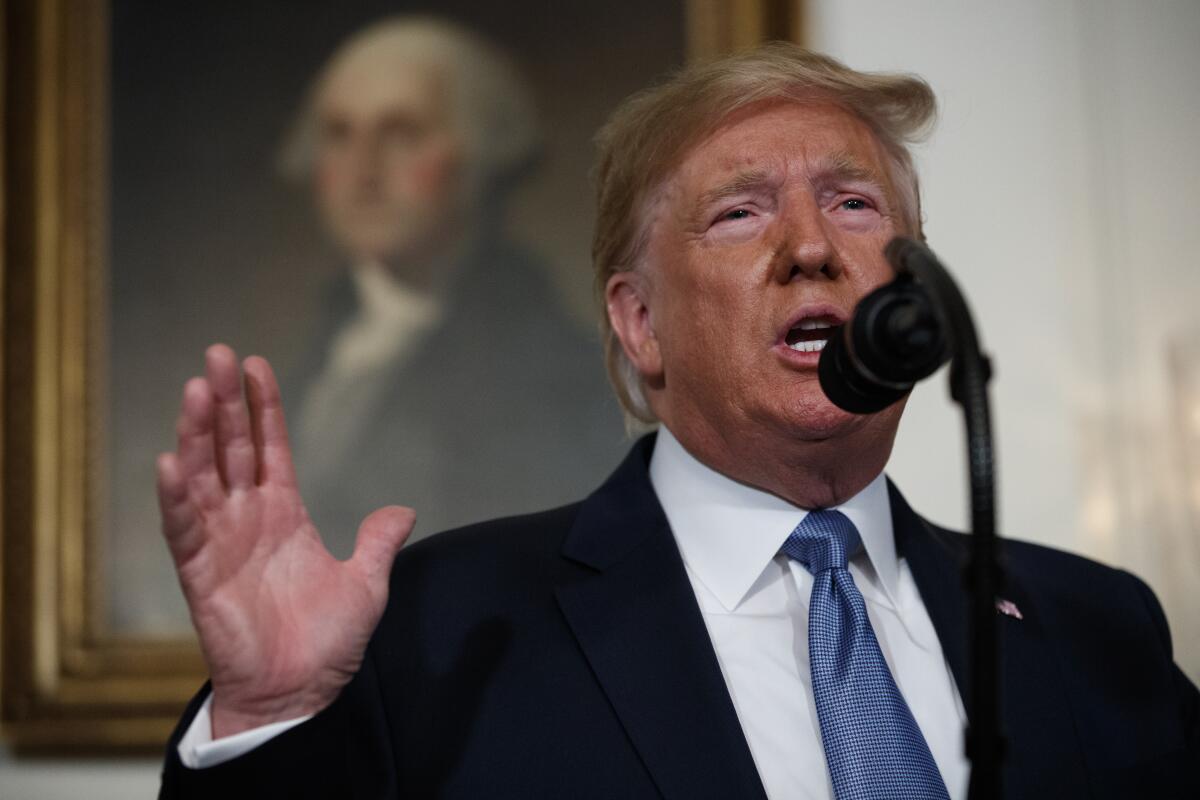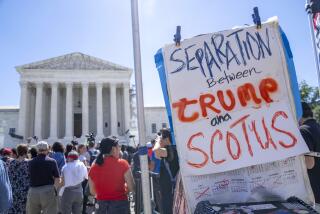Trump’s legal strategy against impeachment is on shaky constitutional grounds, scholars say

- Share via
Washington — Constitutional lawyers said Wednesday that President Trump’s vow not to cooperate with the impeachment inquiry is both unprecedented and unlikely to spare him from being formally charged by the House.
In fact, they say, it may only increase the chances that he will be impeached.
The Constitution says the “House of Representatives shall have the sole power of impeachment,” and it does not give the president a specific role in the process. A president is in some sense like an ordinary defendant who may be subject to a criminal investigation and an indictment, all without his participation or involvement, scholars say.
“The president’s cooperation is not required or needed,” said University of North Carolina law professor Michael J. Gerhardt, an expert on impeachment. And “the House may make that defiance grounds for impeachment,” he added, noting that in 1974, a House committee approved articles of impeachment against President Nixon based in part on his refusal to comply with congressional subpoenas.
Though both Nixon and President Clinton tried behind the scenes to slow or stop impeachment proceedings, they also attempted to cooperate at times, or at least appear to, out of respect for the process and fear they might look like they were hiding something.
“There is no precedent for the president doing what President Trump is doing here: saying I will flatly refuse to cooperate and ordering all employees of the executive branch to refuse to cooperate as well,” said professor Frank O. Bowman, who teaches impeachment law at the University of Missouri and Georgetown.
In Tuesday’s eight-page letter to House Democrats, White House Counsel Pat Cipollone pronounced Trump innocent of wrongdoing and the inquiry “unconstitutional.”
He said Trump’s July 25 phone call asking the new president of Ukraine to do him “a favor” and investigate former Vice President Joe Biden and his son Hunter was “completely appropriate. The president did nothing wrong, and there is no legitimate basis for an impeachment inquiry.”
Legal experts, however, say Trump’s actions were exactly the kinds of things that framers were thinking of when they included an impeachment provision in the Constitution. Trump has acknowledged that even as he asked Ukraine to investigate one of his political opponents, he had ordered that nearly $400 million in aid to Ukraine be withheld.
The White House letter suggests that the inquiry is invalid because there was no formal House vote to launch it, and that Trump and Republicans have so far not been given the right to see evidence and call witnesses. Based on this conclusion, he said, “President Trump and his administration cannot participate in your partisan and unconstitutional inquiry.”
Lawyers took to social media to express surprise and disdain, noting that no such rights or requirements exist in the Constitution.
“This letter is bananas. A barely-lawyered temper tantrum,” tweeted Gregg Nunziata, a former counsel for Senate Republicans.
University of Texas law professor Steve Vladeck said it was remarkable for the top White House lawyer to say in writing that it “is completely appropriate for the president of the United States to actively solicit foreign intervention in U.S. presidential elections. Let’s not lose sight of just how insane that is.”
Lisa Kern Griffin, a Duke law professor, described the letter as a “political stunt that misinterprets the Constitution, ignores relevant precedents and defies common sense.” She said the letter sets the stage for a constitutional crisis.
“Of course, the House can proceed with impeachment based on the testimony and evidence it can access, but it strikes me as dangerous for the entire executive branch to defy congressional oversight.”
Neal K. Katyal, who was acting solicitor general during the Obama administration, noted that Trump’s lawyers have insisted that he is immune from criminal charges, shielded from congressional and state legal demands, including for his tax returns, and now shielded from an impeachment inquiry.
Gerhardt said the White House letter “shows nothing but contempt for the law and the Constitution. Its principal argument is that the president is above the law. In fact, he is not. Impeachment is one of the unique constitutional processes for holding the president accountable for abusing his power.”
It’s not clear how or whether House Democrats will respond to Trump’s vow of noncooperation. In recent weeks, leaders of the House inquiry signaled they are reluctant to go to court or seek to hold officials in criminal contempt for refusing to comply with a subpoena.
No one believes that the Justice Department under Atty. Gen. William Barr would enforce a contempt citation against a Trump advisor or an administration official. And a court battle to enforce a subpoena “would take many months,” Bowman said.
If a federal judge ruled for or against the House, the losing side could appeal to the U.S. Court of Appeals for the District of Columbia Circuit and then to the Supreme Court.
Trump on Wednesday suggested the fight with the House “probably ends up being a Supreme Court case.”
But in the past, the high court has said it views impeachment as a “political question” reserved to the House and Senate. Its most important precedent on this point is Nixon vs. United States in 1993 — not to be confused with the famous 1974 case of the same name involving President Nixon’s secret tapes.
This matter involved Mississippi Judge Walter Nixon, who appealed after he was impeached in 1989, contending that the process was unfair. He lost in a unanimous decision.
Chief Justice William H. Rehnquist said the Constitution states that “the Senate shall have the sole power to try all impeachments,” and he noted that the framers decided the Supreme Court would not have “any role in impeachments.” That was partly by design, because the framers did not want justices, who are appointed by the president, to decide on his conviction and removal from office.
Six years later, Rehnquist served as the presiding judge in the Senate impeachment trial of President Clinton. But the role was largely ceremonial.
In 2010, Jonathan Turley, a George Washington law professor, served as defense counsel in the impeachment of Judge Thomas Porteous. The lead prosecutor for the House was Rep. Adam B. Schiff (D-Burbank) — who is now leading the Trump impeachment investigation.
On Wednesday, Turley said Trump’s lawyers were undercutting his possible defenses, including assertions of executive privilege.
“This letter further erodes the position of the president. It’s not that I disagree with the legal strategy. I cannot perceive any legal strategy at all,” he said.
Walter Dellinger, a White House lawyer under Clinton, said Trump’s vow of noncooperation might make sense strategically or politically.
“They may be covering up very damaging information that, if it came to light, would create overwhelming support for impeachment,” he said.
Also, part of the White House strategy also appears to be painting the entire process as flawed and partisan in an attempt to undercut public support.
But Dellinger disagreed with those who see a constitutional crisis. “The Constitution gave us an answer to this problem. It’s impeachment in the House and removal in the Senate,” he said.
More to Read
Get the L.A. Times Politics newsletter
Deeply reported insights into legislation, politics and policy from Sacramento, Washington and beyond. In your inbox three times per week.
You may occasionally receive promotional content from the Los Angeles Times.











